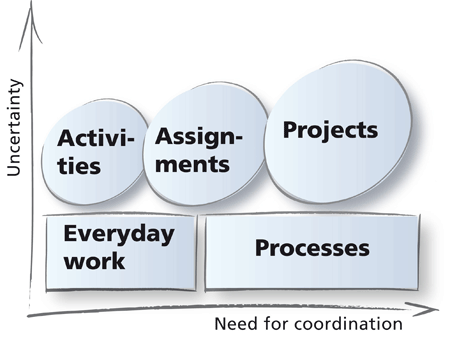About our models
Every organization needs to deal with a huge number of tasks. We look at these tasks from the perspectives “uncertainty” and “need for coordination”. Tasks with low uncertainty and low need for coordination we call everyday work. If the need for coordination is greater and the work form is documented and to be repeated many times we call it a process or a method. Everyday work and processes make up the routine business of an organization.

Projects, assignments or activities
Projects are a good method for some tasks, but not for others. A task with a high uncertainty factor and a great need for coordination is usually called a project. Tasks with a lower need for coordination we call assignments. There are also other factors that help us determine if a task is an assignment or a project:
- the scope of the task
- how accustomed the organization is to handling this type of task
- dependencies on the project environment
- the need for reevaluation during realization
- the need to focus efforts
In addition to project and assignments, there are one-time tasks that are much simpler. They are called tasks or activities and can be done independently. Activities are not as formal, and the person responsible for them can handle them independently, using any parts of the project method s/he finds suitable. The following pages give you an overview of our different models for projects, assignments and activities and their components. Our aim is to provide you with ready-to-use tools. It lets members of the working team focus on the content of the work instead of creating methods. We believe in simplicity, flexibility and clarity in creating and using working models. We are happy to help you adapt the different models, since we have extensive experience of applying it to individual projects, assignments and tasks and using them for business-specific models.